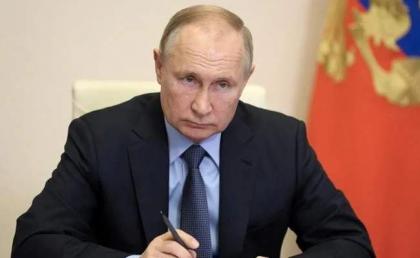
KYIV, May 17 (NNN-AGENCIES) — Russian President Vladimir Putin warned Finland and Sweden to expect a “response” for applying to join NATO as Ukraine braced for a new push by Moscow’s forces in its eastern Donbas region.
Swedish Prime Minister Magdalena Andersson on Monday confirmed her country would apply to join the military alliance, the day after Finland — which shares a 1,300-kilometre border with Russia — said the same.
The two Nordic countries are giving up decades of military non-alignment over fears they could be next in line following Moscow’s invasion of Ukraine on Feb 24.
Russia, whose war has sparked global outrage, killed thousands and created millions of refugees, warned that NATO’s expansion would have consequences.
The move poses “no direct threat for us… but the expansion of military infrastructure to these territories will certainly provoke our response”, Putin told a meeting of a Moscow-led security alliance.
Deputy Foreign Minister Sergei Ryabkov had earlier called it a “grave mistake with far-reaching consequences”.
Russia has already suspended electricity supplies to Finland, citing payment issues.
But Finnish Prime Minister Sanna Marin told lawmakers: “Our security environment has fundamentally changed.
“The only country that threatens European security, and is now openly waging a war of aggression, is Russia.”
Despite the resources of its giant neighbour, Ukraine has managed to repel Russian forces for longer than many initially thought, fortified by weapons and cash from Kyiv’s Western allies.
NATO on Sunday promised its open-ended support, with German foreign minister Annalena Baerbock saying it would provide military assistance “for as long as Ukraine needs”.
Since failing to take the capital Kyiv in the early weeks of the war, Moscow is currently focusing on the eastern region of Donbas, near the Russian border and home to pro-Russian separatists.
Ukrainian presidential adviser Oleksiy Arestovich told local television Sunday that Russian troops were being redeployed towards Donbas after withdrawing from Kharkiv, the second-largest city near the Russian border.
Arestovich said the Russian troops that had been withdrawn were being sent towards Lugansk and “their task is to take Severodonetsk,” the easternmost city still held by Ukraine.
Ukraine’s presidency reported Monday that two people were killed and nine were wounded, including a child, in shelling on a Severodonetsk hospital.
The fall of Severodonetsk would grant the Kremlin de facto control of Lugansk, one of two regions — along with Donetsk — that comprise Donbas.
Fierce fighting over almost three months of war has caused six million refugees to flee Ukraine, and another eight million have been internally displaced, according to UN agencies.
One of the most totemic battles in the war has been for Mariupol, the southern port city which has largely fallen to Russian forces except for final hold-outs at the Azovstal steel plant.
Russia’s defence ministry said Monday it had reached a deal to evacuate wounded soldiers from the plant, where hundreds of Ukrainian troops remain holed up in underground tunnels.
There was no immediate confirmation from Ukrainian officials of the deal.
Ukraine’s Western allies have levelled unprecedented economic sanctions against Moscow to punish it for the invasion, but at the same time, European nations continue to buy Russian oil and gas.
EU foreign ministers met Monday in Brussels to discuss a proposed ban on Russian oil being blocked by Hungary, which said it would cost 15 to 18 billion euros ($16 to $19 billion) to prepare its economy for the move.
Portugal’s Foreign Minister Joao Gomes Cravinho said it could take “a couple of weeks” to hammer out agreement, a timescale that would take the debate up to the next full summit of EU leaders.
The war meanwhile is taking its toll on the continent’s growth. The European Commission sharply cut its eurozone growth forecast for 2022 to 2.7 percent, blaming skyrocketing energy prices.
Separately, French automaker Renault has handed over its Russian assets to the Russian government, marking the first major nationalisation since the onset of sanctions.
Renault controlled 68 percent of AvtoVAZ, the largest carmaker in Russia with the country’s top brand Lada, but had been under pressure to pull out of Russia following the invasion. — NNN-AGENCIES





